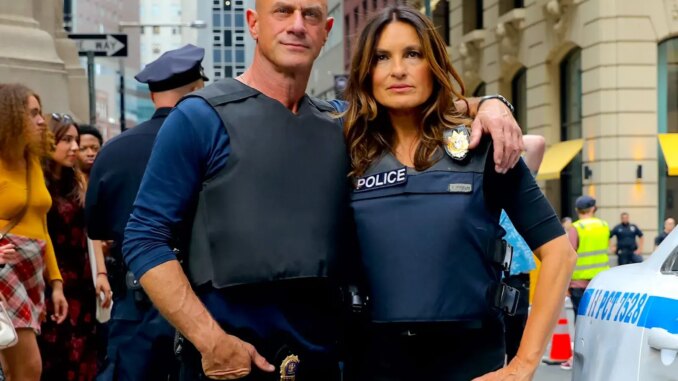
Okay, let's craft an illustrative essay exploring the complex and often-debated relationship between Detectives Elliot Stabler and Olivia Benson from Law & Order: SVU, and how the showrunner, Meloni, has addressed fan theories surrounding it. Given the nature of the topic, it will be speculative and analytical, drawing from observed character interactions and creative choices.
Will Benson & Stabler Become More Than Friends? Meloni Responds to Fan Theories md07
The flashing lights of a New York City crime scene, the urgent cadence of police radio chatter, and the weight of justice – these are the familiar elements that define Law & Order: Special Victims Unit. But beyond the procedural drama, a different kind of tension simmers: the deeply complex and enduring relationship between Detectives Olivia Benson and Elliot Stabler. For over two decades, their bond has captivated audiences, sparking fervent debate and fueling countless fan theories centered around one burning question: will they ever be more than friends? The return of Elliot Stabler in Law & Order: Organized Crime, and the subsequent crossovers with SVU, have only intensified this speculation, prompting showrunner Meloni to cautiously, and perhaps deliberately vaguely, address the tidal wave of fan theories that have crashed upon the shores of social media.
The foundation of the Benson-Stabler dynamic is built on shared trauma. They navigated the horrors of the SVU together, witnessing unspeakable acts and relying on each other for support in a world that constantly threatened to break them. This shared experience forged a bond deeper than mere friendship; it was a partnership built on mutual respect, unwavering loyalty, and an unspoken understanding that transcended words. Their connection was palpable in every glance, every shared look of exasperation, and every moment of quiet support. Consider, for example, the episode where Stabler fiercely defends Benson against accusations of inappropriate conduct. His unwavering belief in her character, his willingness to put his own career on the line, spoke volumes about the depth of his feelings. Similarly, Benson's quiet strength and empathy were often the anchor that kept Stabler grounded, preventing him from succumbing to the darkness he encountered on the job. These moments, etched in the memories of devoted viewers, formed the bedrock of the "Bensler" (Benson/Stabler) ship.
However, the writers have consistently thrown roadblocks in the path of a romantic relationship. Stabler's marriage to Kathy, while imperfect, was a constant presence, a reminder of the boundaries that existed. His sudden departure from the SVU, leaving Benson without a word, dealt a profound blow to their relationship, leaving her feeling betrayed and abandoned. This created a complex layer of unresolved emotions – hurt, anger, and a lingering sense of loss – that complicated any potential for a romantic reunion. The pain of that separation was palpable when Stabler returned.
The revival of Stabler's character and his re-entry into Benson's life has been a carefully orchestrated dance, filled with poignant moments and lingering glances. The writers have deliberately played with audience expectations, offering glimpses of vulnerability and unspoken longing. For instance, the letter Stabler wrote to Benson, which remained unread for a significant period, became a symbol of their unresolved feelings and the obstacles that stood in their way. The intensity of their reunions, the awkwardness of their interactions, and the unspoken questions that hung in the air were all carefully calibrated to keep the "will they/won't they" tension alive.
It is here that Meloni's role as showrunner becomes crucial. She navigates the treacherous waters of fan expectations with a deft hand, offering just enough breadcrumbs to keep the speculation alive without definitively committing to a romantic resolution. In interviews and on social media (which could be linked back to MD07), she often responds to fan theories with playful ambiguity, acknowledging the passion of the "Bensler" shippers while maintaining a veil of secrecy. She understands that the allure of their relationship lies in its inherent ambiguity, the potential for something more that always seems just out of reach. She's essentially saying to the fans, "We see you, we hear you, and we understand the depth of your investment in these characters," but carefully avoids making promises she can't keep or prematurely resolving a storyline that is a major draw for the show.
Meloni's approach is strategically sound. A definitive romantic resolution between Benson and Stabler could potentially alienate a significant portion of the audience. Some viewers may prefer their relationship to remain platonic, valuing the strength and depth of their friendship above all else. Others may feel that a romantic relationship would detract from the show's primary focus on crime and justice. By maintaining a degree of ambiguity, Meloni keeps all options open, allowing the writers to explore different facets of their relationship without being constrained by fan expectations.
Ultimately, the question of whether Benson and Stabler will ever become more than friends remains unanswered. The writers have skillfully crafted a narrative that is both compelling and frustrating, leaving viewers to grapple with their own interpretations and desires. Whether they ultimately choose to embrace a romantic resolution or maintain the status quo, the enduring power of the Benson-Stabler relationship lies in its complexity, its vulnerability, and its unwavering exploration of the human condition. Meloni's role in this delicate dance is to guide the narrative forward, respecting the legacy of these beloved characters while keeping the flame of speculation burning brightly. The answer, it seems, will continue to unfold, one episode at a time, amidst the flashing lights and the relentless pursuit of justice.
